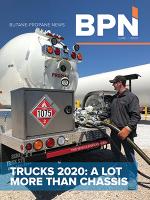Monday, June 15, 2020
 At the beginning of 2020, BPN spoke with the National Propane Gas Association’s (NPGA) Jeff Petrash, vice president and general counsel, and deputy counsel regulatory affairs, Sarah Reboli, about the coming decade. Midwest propane supply issues had consumed their time in late 2019. “Electrification will be a big issue for a number of years ahead for NPGA,” Petrash told BPN in January. Other issues discussed included a plan to go back to FERC in June to address how index pricing is set for liquids shipped on pipelines; natural gas expansion issues brewing in Utah and Iowa; and new requirements from the Federal Motor Carrier Safety Administration (FMCSA). With the spread of COVID-19, addressing the pandemic and its many challenges while still focusing on all other pressing issues became NPGA’s new plan for 2020, with all NPGA staff members hands on deck, but from remote locations as all are teleworking due to Washington, D.C.’s stay-at-home order.
At the beginning of 2020, BPN spoke with the National Propane Gas Association’s (NPGA) Jeff Petrash, vice president and general counsel, and deputy counsel regulatory affairs, Sarah Reboli, about the coming decade. Midwest propane supply issues had consumed their time in late 2019. “Electrification will be a big issue for a number of years ahead for NPGA,” Petrash told BPN in January. Other issues discussed included a plan to go back to FERC in June to address how index pricing is set for liquids shipped on pipelines; natural gas expansion issues brewing in Utah and Iowa; and new requirements from the Federal Motor Carrier Safety Administration (FMCSA). With the spread of COVID-19, addressing the pandemic and its many challenges while still focusing on all other pressing issues became NPGA’s new plan for 2020, with all NPGA staff members hands on deck, but from remote locations as all are teleworking due to Washington, D.C.’s stay-at-home order. In mid-May Petrash and Reboli were joined by fellow NPGA staffers Sarah McLallen, vice president of communications and member services, and Lesley Garland, vice president of state affairs, in a discussion with BPN about new issues that arose since our discussion at the beginning of the year. “I returned from a trip in mid-March, went straight home, and have not been back to the office since,” Petrash said. “The COVID-19 pandemic has all staff members working from home since March 15. Between the virus and all our existing issues, we’ve been busy the past couple of months!”
“We’ve been engaging with NPGA’s Propane Supply and Logistics Committee,” Petrash said. “With lower oil and gas prices, rig counts were down before the COVID-19 virus further slowed demand. Use of diesel fuel is down 20%, motor gas is down 30%, and jet fuel is down 60%. While we can’t move the levers of the commercial marketplace, we can keep the industry informed about what is happening and what their options are.”
With the infrastructure for exporting propane more developed than ever, there is more export capacity from the Gulf Coast as well as Marcus Hook in the Northeast. “Looking back at supply data over the past six years, when propane demand peaks in the U.S., exports drop,” Reboli said.
Reboli noted that laws and appropriations related to COVID-19 have been passing in Congress faster than agencies can handle them. “All details related to small business, tax credits, and paycheck programs must be provided to the industry,” she said. For Garland, there has been a surge of information to monitor with specific state requirements and recovery proposals. Some key questions have included whether employers can take employee temperatures; how companies can obtain face masks; and sharing with staff how best to handle existing requirements and COVID-19 requirements. Both Garland and Reboli acknowledged industry members are in uncharted territory following sometimes rapidly changing requirements while still taking care of customers.
An NPGA survey of industry members has aided the staff in focusing on members’ needs and their various situations and concerns. Respondents, by sector, were intrastate marketers (38%), interstate marketers (25%), distributors (20%), service providers (9%), and manufacturers (6%). Some highlights of the survey include:
- 77% of survey respondents indicated the level of business operations in April 2020 was the same (31%) or slightly reduced (46%) from April 2019 operations; 10% saw increased activity and 13% reported severely reduced activity.
- 95% of respondents reported employment levels in April 2020 were similar or only slightly lower than a month earlier on March 1. None reported significantly lower employment levels.
- 85% reported that projects, deliveries (gallons), and purchase orders had not been delayed at all (38%) or that less than 25% had been delayed (47%).
- 61% of respondents reported that they had no cancellations of existing projects and gallons delivered, while 36% reported they had some (less than 25%) cancellations.
- 43% of the respondents applied for federal aid through the Paycheck Protection Program.


